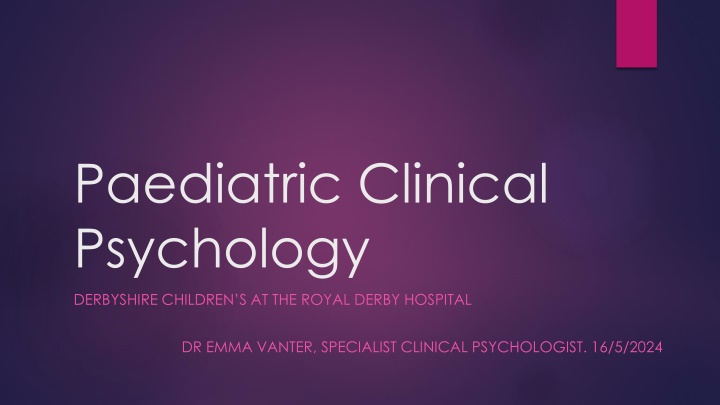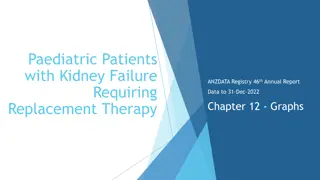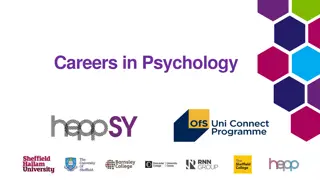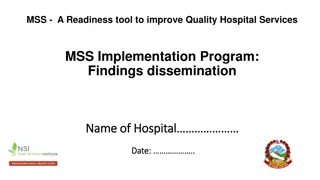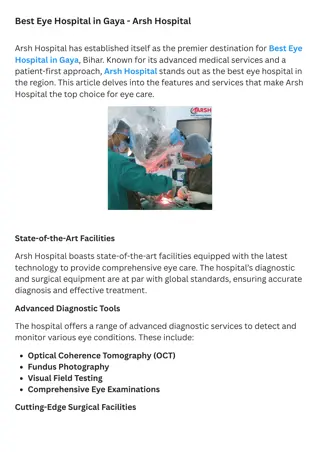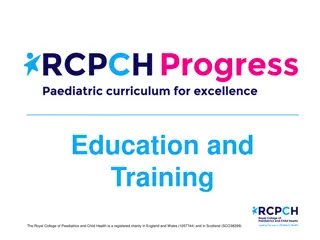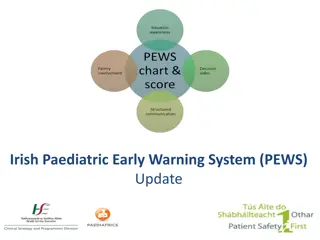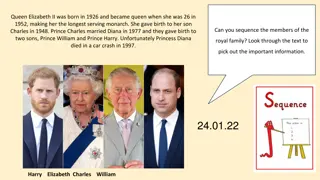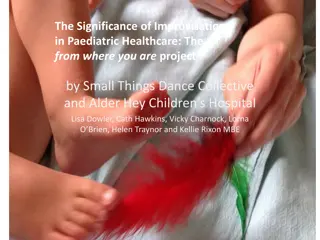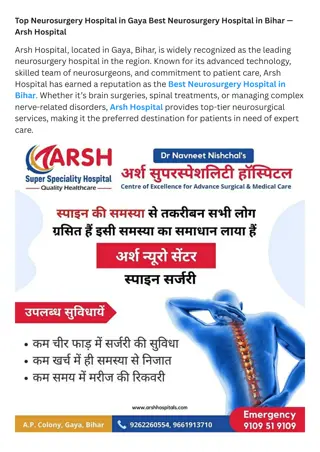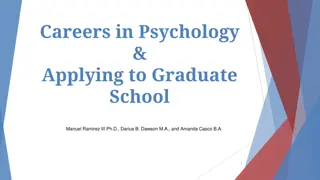Paediatric Clinical Psychology Services at Royal Derby Hospital
Specialist clinical psychologist, Dr. Emma Vanter, offers paediatric clinical psychology services at the Royal Derby Hospital. The department provides various services including positive behavior support, autism assessment and intervention, youth justice psychology, and more. Referral pathways are established for children up to age 16, with a focus on addressing complex behavior issues, intellectual disabilities, and inpatient care. The team emphasizes emotional wellbeing support for young patients and their families, helping them cope with the impacts of medical conditions on various aspects of life.
Download Presentation

Please find below an Image/Link to download the presentation.
The content on the website is provided AS IS for your information and personal use only. It may not be sold, licensed, or shared on other websites without obtaining consent from the author.If you encounter any issues during the download, it is possible that the publisher has removed the file from their server.
You are allowed to download the files provided on this website for personal or commercial use, subject to the condition that they are used lawfully. All files are the property of their respective owners.
The content on the website is provided AS IS for your information and personal use only. It may not be sold, licensed, or shared on other websites without obtaining consent from the author.
E N D
Presentation Transcript
Paediatric Clinical Psychology DERBYSHIRE CHILDREN S AT THE ROYAL DERBY HOSPITAL DR EMMA VANTER, SPECIALIST CLINICAL PSYCHOLOGIST. 16/5/2024
Department of Clinical Psychology (Children s) Positive Behaviour Service Paediatric Clinical Psychology Complex Behaviour Service Youth Justice Psychology Autism Assessment (+ Intervention)
Referral Pathways Paediatric Clinical Psychology via SPOA (usually from health professionals) Up to age 16* Autism team - via Neurodevelopmental Pathway Complex Behaviour Service (CBS) via SPOE (for children with Intellectual/Learning Disability) Positive Behaviour Service (PBS) for inpatients at Derbyshire Children s Hospital Youth Justice Psychology no external referrals accepted
Paediatrics Term used to mean medical care for babies, children, and adolescents Paediatric Clinical Psychology Paediatric Clinical Psychology Emotional wellbeing support for young people (and their families) who have medical/ physical health symptoms or diagnoses.
Physical health symptoms / diagnosis can affect My family My identity My independence My hopes and dreams My friendships My learning My attendance My sensory abilities What I can and can t do What I can and can t cope with How I look How I feel physically My energy levels My behaviour How I feel emotionally My confidence Some days / times more than others My concentration what s on my mind My vulnerability
Expected ----------------- Clinically significant impacts impacts Effects of health condition getting in the way of normal life +++ Loss of self, loss of positive mood, intrusive thoughts or anxieties related to health symptoms/diagnosis Falling behind socially or academically as a result of physical health symptoms or care needs Parent/professional concerns It takes time to adjust to new diagnosis / treatments Sometimes feeling upset about it Symptoms sometimes getting in the way Okay most of the time, able to live well in spite of diagnosis/symptoms
Example: Concussion after falling off bike Daily headaches six months on, impacting ++ on school attendance. Worrying about attending lessons due to having fallen behind. Getting anxious about going back, feeling too nauseous to try. Family concerned this might be permanent. No medical reason for headaches identified. Getting headaches at the end of the school day for a couple of weeks, struggling to get homework done.
Clinical Psychology involvement you might encounter: Time off - appointments usually hospital based, 1-2 hours (can be tiring) Sometimes appointments might need to be at school School observations School conversations / meetings TAF / Professionals meetings Ideas to try (home / school / both) Psychometric assessments
School observations A visitor to the school come to see how we do things . Structured time (main class, without support) Supported learning (if provided) Less / Un structured time (lunch, PE, etc) * The observer will not have met the child!
Psychometric Assessment or Therapy Session in school Quiet, confidential space May need a table May help to have a familiar adult available/present To avoid favourite times if possible!
Psychometric Assessments Also called Cognitive Assessment , IQ Assessment or Neuropsychological Assessment Puzzles and questions to understand areas of cognitive strength and difficulty Information from school helpful to triangulate - Observation (nursery, primary) - Conversation - Questionnaires
Multi- faceted Assessment to make sense of a young person s difficulties. To understand what might be helpful
SO MANY QUESTIONNAIRES!!!!! (Thank you!!!!!)
Communication and Feedback Confidentiality Safeguarding How are things from your end? What does the young person and their family choose / wish to share with school? Possible reports / review meetings
Scope of involvement Might be open to more than one psychologist or psychology team at once Might be brief, 1-6 sessions Might be indirect work, or direct work Might be longer term e.g. over transitions Diabetes / Cystic Fibrosis may have contact via clinics until move to adult services
Case Example Kiran age 10 has epilepsy, had surgery for this 6 months ago. He has not had any seizures since the surgery. Paediatrician refers to SPOA: the family is concerned, Kiran is falling behind at school and seems low in mood. His behaviour has deteriorated. When he gets home from school he just wants to go to his room. He is refusing to do his physiotherapy exercises. He doesn t see friends. Kiran is clingy in the mornings and doesn t want to leave his parents.
Initial Assessment Kiran and his parents come to the hospital for an initial assessment. This lasts 90 minutes. Some time is spent with Kiran, then Kiran goes to another room to play and his parents continue to talk to the psychologist. The psychologist and the family together start to make sense of what might be happening.
Formulation / things to make sense of Family and Kiran s expectation of life after surgery. Medical records and the reasons for the surgery e.g. MRI findings Kiran yawns a lot during the appointment. He is sleeping long hours at night. Kiran feels too tired to do his physio (or anything else) after school.
Intervention might be Psychoeducation to family, to Kiran Talking / meeting with school to understand concerns Working with Kiran around his identity, and any anxieties he might have (weekly/ fortnightly sessions) Thinking with family and/or school and physiotherapy service about any changes that might help. Try these, and review. Cognitive assessment to understand areas of difficulty for Kiran. Report with recommendations.
